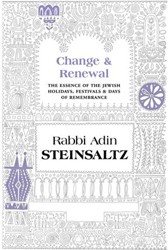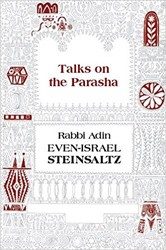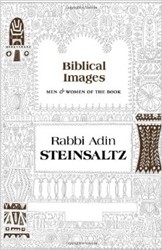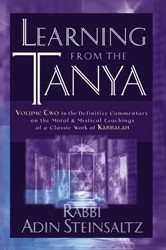Rabbi Adin Steinsaltz is perhaps best known for his monumental translation and commentary to the entire Talmud. As such he is the rebbe, or teacher, of untold thousands all over the world. He is also a Lubavitch Hasid and had a close relationship with the Lubavitcher Rebbe for many years. It is twenty years since Rabbi Menachem Mendel Schneerson died, and this biography is Rabbi Steinsaltz’s tribute to his rebbe. It must be noted that in hasidic parlance, a rebbe is much more than a teacher. He is also a father figure, the supreme authority and arbiter of all matters spiritual and mundane, the focus of his followers’ awe and reverence, and their religious mentor.
Rabbi Steinsaltz is an insider, a follower, and a believer. This is not a dispassionate compilation of details about the Rebbe’s life. It is an analytical rather than a descriptive biography. Instead of focusing on minutia, Rabbi Steinsaltz gives us a great deal of explanation and commentary about Lubavitch Hasidism, the history and practices as they related to the Rebbe. This is not to say that we do not learn things we didn’t know before — for example, the Rebbe ate mostly hard chocolate and diluted milk during the day. We also learn in passing that he was ordained by Rabbi Yehiel Yakov Weinberg, a recognized non-Hasidic Orthodox rabbi who headed the Hildesheimer Rabbinical Seminary in Berlin.
The reader will have to judge for him/herself the chapters dealing with the Rebbe’s miracles, and his connection to the supernatural. The seventeen chapters and appendices provide a glimpse into a world rarely seen by outsiders. Not every aspect of the Rebbe’s life is laid bare, however, what is revealed demonstrates deep devotion and strong beliefs. My Rebbe is as much about the movement as it is about the man who led it for forty years. This is its charm and importance. Key Hasidic concepts are explained coherently so that we can begin to understand how and why the Rebbe behaved the way he did. The issue of the Messiah, his political views, relationship to Israel and Zionism, family disputes, and other aspects of the Rebbe’s life and impact are dealt with sensitively and selectively in the tightly written chapters.
The Rebbe loved children, and prayed successfully countless times for others to give birth, but he and his wife remained childless.
Rabbi Steinsaltz has given us an intimate look at the life of a great leader. The Rebbe’s legacy is more in the form of marching orders. There is no successor to the Rebbe, yet the movement is flourishing. This book is a fine monument to his achievements.
Related content:
- Rebbe: The Life and Teachings of Menachem M. Schneerson, the Most Influential Rabbi in Modern History by Rabbi Joseph Telushkin
- Interview with Joseph Telushkin
- A Poem: The Quantum Rabbi by Norbert Hirschhorn





